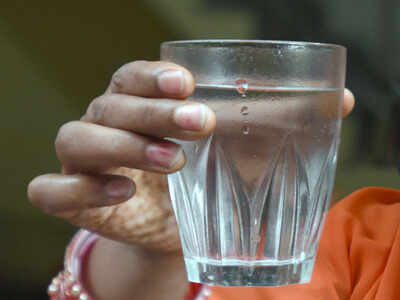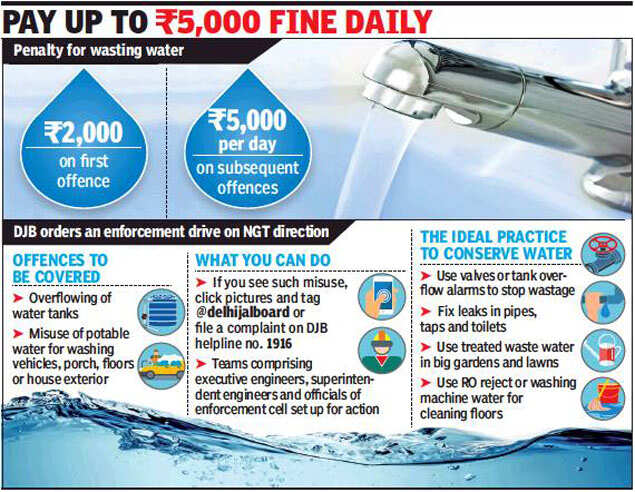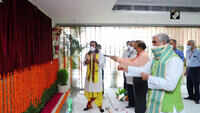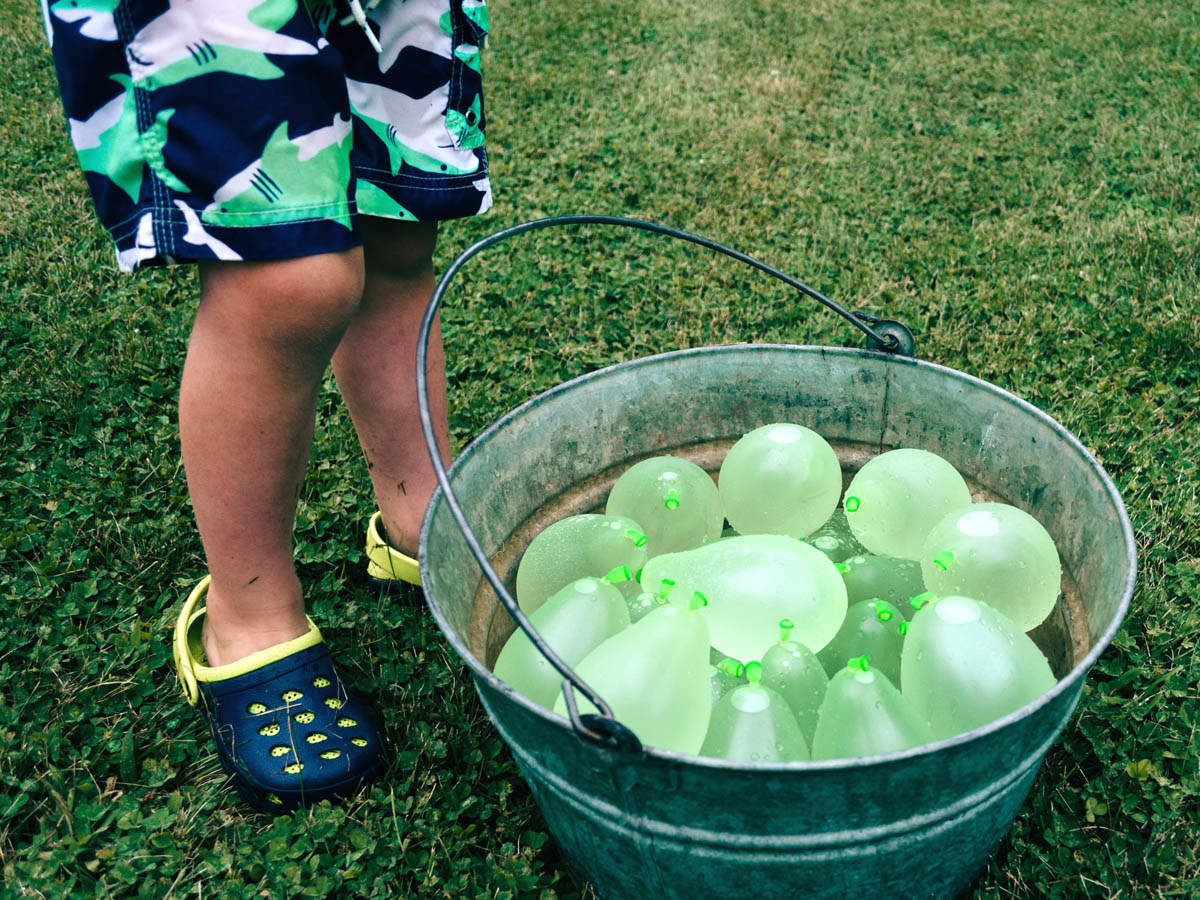
NEW DELHI: The next time you see someone wasting potable water, just click a photograph and send it to Delhi Jal Board (DJB) for taking penal action.
Though Delhi is a water-deficient city with a 300 million gallons per day demand-supply gap, overflowing tanks and people washing vehicles and floors with piped water are a common sight across colonies. However, such reckless behaviour is now bound to cause a heavy burden on the violator’s pocket.

Based on directions of National Green Tribunal (NGT), DJB on Wednesday issued orders for a crackdown on misuse of potable water. Inspection and challan teams would fine first-time violators Rs 2,000 and repeat offenders Rs 5,000 per day.
A senior DJB official said that the engineering wing, revenue department and enforcement cell have been tasked with issuing challans for such violations. “The teams constituted at the zonal level comprise executive engineers, superintendent engineers, maintenance staff and enforcement cell. An intensive drive will be carried out soon. Zone-wise compliance reports will be submitted every Monday,” he added.
The offences covered in the drive would include overflowing tanks, washing of vehicles, cleaning of porches, floors and houses, and wasteful use of piped water in gardens.
Raghav Chadha, DJB vice-chairman, said, “People can inform us about such violations by taking photos and tagging us on the official Twitter handle @delhijalboard or by lodging a complaint on the helpline number 1916.”
While the Delhi Water Policy lays clear emphasis on conservation and minimising inefficient use, the message doesn’t seem to have percolated to the city’s dwellers.
Experts said low public consciousness about scarcity and economic value of water results in its wastage and inefficient use. Even enforcement by DJB has been somewhat lax. Between April 2019 and March 2020, no challans were issued for misuse of water. The intervention of NGT was required to bring about a change.
“Ideally, people should mandatorily use overflow prevention valves or tank overflow alarms to stop water wastage. It is also their duty to fix leaks in pipes, taps and toilets. Water-efficient devices, faucets and aerators are also available in the market. We should avoid using drinking water wastefully in gardens and lawns. It is a penal offence to wash cars and floors with piped water,” the official said. He recommended that instead of throwing away the reject water from RO purifiers, it should be used in washing or cleaning floors.
The huge demand-supply gap has also led to many people relying on illegal borewells, which further depletes the sub-soil reserves. So far, DJB has identified 20,351 illegal borewells of which 6,283 have been sealed. “We have limited water from Yamuna and underground aquifers. It is our collective duty to treat water as a limited resource of high value,” the official said.
In Video:Beware! Your neighbour can report you for wasting drinking water in Delhi
Though Delhi is a water-deficient city with a 300 million gallons per day demand-supply gap, overflowing tanks and people washing vehicles and floors with piped water are a common sight across colonies. However, such reckless behaviour is now bound to cause a heavy burden on the violator’s pocket.

Based on directions of National Green Tribunal (NGT), DJB on Wednesday issued orders for a crackdown on misuse of potable water. Inspection and challan teams would fine first-time violators Rs 2,000 and repeat offenders Rs 5,000 per day.
A senior DJB official said that the engineering wing, revenue department and enforcement cell have been tasked with issuing challans for such violations. “The teams constituted at the zonal level comprise executive engineers, superintendent engineers, maintenance staff and enforcement cell. An intensive drive will be carried out soon. Zone-wise compliance reports will be submitted every Monday,” he added.
The offences covered in the drive would include overflowing tanks, washing of vehicles, cleaning of porches, floors and houses, and wasteful use of piped water in gardens.
Raghav Chadha, DJB vice-chairman, said, “People can inform us about such violations by taking photos and tagging us on the official Twitter handle @delhijalboard or by lodging a complaint on the helpline number 1916.”
While the Delhi Water Policy lays clear emphasis on conservation and minimising inefficient use, the message doesn’t seem to have percolated to the city’s dwellers.
Experts said low public consciousness about scarcity and economic value of water results in its wastage and inefficient use. Even enforcement by DJB has been somewhat lax. Between April 2019 and March 2020, no challans were issued for misuse of water. The intervention of NGT was required to bring about a change.
“Ideally, people should mandatorily use overflow prevention valves or tank overflow alarms to stop water wastage. It is also their duty to fix leaks in pipes, taps and toilets. Water-efficient devices, faucets and aerators are also available in the market. We should avoid using drinking water wastefully in gardens and lawns. It is a penal offence to wash cars and floors with piped water,” the official said. He recommended that instead of throwing away the reject water from RO purifiers, it should be used in washing or cleaning floors.
The huge demand-supply gap has also led to many people relying on illegal borewells, which further depletes the sub-soil reserves. So far, DJB has identified 20,351 illegal borewells of which 6,283 have been sealed. “We have limited water from Yamuna and underground aquifers. It is our collective duty to treat water as a limited resource of high value,” the official said.
In Video:Beware! Your neighbour can report you for wasting drinking water in Delhi

Coronavirus outbreak
Trending Topics
LATEST VIDEOS
City
 Mumbai rains: 3 people trapped as chawl collapses in Malvani area
Mumbai rains: 3 people trapped as chawl collapses in Malvani area  AMU student lodges complaint against fellow student who allegedly threatened her on social media
AMU student lodges complaint against fellow student who allegedly threatened her on social media  Minor raped in Covid-19 isolation ward of Patna Medical College and Hospital, guard held
Minor raped in Covid-19 isolation ward of Patna Medical College and Hospital, guard held  Gangster Abu Salem's aide Gajendra Singh arrested by Special Task Force from Noida
Gangster Abu Salem's aide Gajendra Singh arrested by Special Task Force from Noida
More from TOI
Navbharat Times
Featured Today in Travel
Get the app





